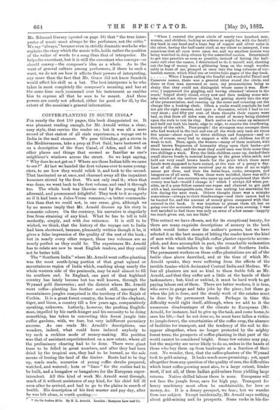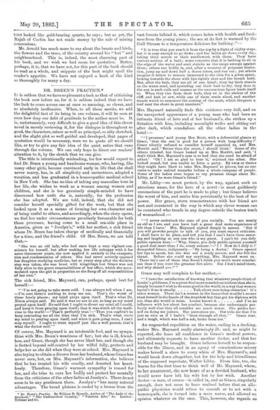COFFEE-PLANTING IN SOUTH INDIA.* FOR nearly the first 150 pages,
this book disappointed us. It was pleasant reading enough, for Mr. Arnold writes a clear, easy style, that carries the reader on ; but it was all a mere record of that stalest of all stale experiences, a voyage out to India in the mail steamer. We pass Gibraltar, get a storm in the Mediterranean, take a peep at Port Said, have bestowed on us a description of the Suez Canal, of Aden, and of lots of other places and things that seemed as familiar as one's neighbour's windows across the street. So we kept saying, " Why does he not get on ? Where are those Indian hills we came to see ?" At last we handed the first volume over to some young- sters, to see how they would relish it, and took to the second. That fascinated us at once, and charmed away all the impatient humours stirred by the first. We not only read it; when that was done, we went back to the first volume, and read it through too. The whole book was likewise read by the young folks aforesaid, and pronounced delightful. They took to it as eagerly .as if it had been a Jules-Verne romance,—a better commenda- tion than that we could not, in one sense, give, although we by no means imply that Mr. Arnold dresses up his story in romantic colours. On the contrary, his narrative is singularly free from straining of any kind. What be has to tell is told modestly, simply, and with due reticence. It is still to be wished, we think, that the history of the voyage out to India had been shortened, because, pleasantly written though it be, it .gives a false impression of the quality of the rest of the book ; but in nearly every other respect, these two volumes are as nearly perfect as they could be. The experiences Mr. Arnold has to relate are new to most English readers, and they could not be better told.
The " Southern India" where Mr. Arnold went coffee-planting was the most south-lying portion of that great upland or mountainous region of India which, reaching along nearly the whole western side of the peninsula, may be said almost to fill its southern end. In England, one part of that highland country has lately become but too well known, through the Wynaad gold discoveries ; and the district where Mr. Arnold went coffee - planting lies further south still, amongst the mountainous jungles comprised in the territory of the Rajah of Cochin. It is a great forest country, the home of the elephant, tiger, and bison, a country till a few years ago, comparatively speaking, unknown. Latterly, however, the pushing English- man, impelled by his earth-hunger and his necessity to be doing something, has taken to converting this forest jungle into coffee gardens, with, we fear, but very indifferent pecuniary success. As one reads Mr. Arnold's descriptions, one wonders, indeed, what could have induced anybody to try such a reckless mode of money-making. His position was that of assistant-superintendent on a new estate, where all the preliminary clearing had to be done. There were giant trees to be felled in great numbers, and after they had been dried by the tropical sun, they had to be burned, as the sole means of freeing the land of the timber. Roots had to be dug 'up, roads made, nurseries of young coffee shrubs prepared, -watched, and watered ; huts or " lines " for the coolies had to be built, and a bungalow or bungalows for the European super- intendent. All this kind of work Mr. Arnold went through, much of it without assistance of any kind, for his chief fell ill soon after he arrived, and had to go to the plains in search of health. His description of his first muster and pay day, after he was left alone, is worth quoting :—
• On the Indian Hills. By E. L. Arnold. London Sampson Low and Co.
"When I entered the great circle of nearly two hundred men, women, and children, looking as solemn as might be, with the fateful day-book in one hand and a huge bag of copper and silver coins in the other, having the half-caste clerk at my elbow to interpret, I was conscious that all eyes were upon me, and my smallest motion was being watched in deep silence by the assembled coolies. Determined to get into practice as soon as possible, instead of letting the half. caste call over the names, I determined to do it myself, and, shooting out the bag of money into a glittering heap on the rough wooden table in front of me, plunged at once into the long columns of out- landish names, which filled ten or twelve folio pages of the day-book.
When I began calling the fearful and wonderful Tamil and Canarese names, there was a general titter round the circle, and three or four men answered at once, my pronunciation being so shaky that they could not distinguish whose name it was. How- ever, I suppressed the giggling, and having obtained 'silence in the court,' forged slowly ahead, every now and then making some mis- take which set the natives smiling, but getting slowly into the way of the pronunciation, and running np the sums and counting out the change like a booking clerk. Often a coolie would conclude he had not got the right amount, and open a discussion, which I had to cut very short ; and fifty per cent. of them thought their rupees were bad, so that from all sides rose the sound of money being chinked upon the rock to test its ring. Each native as he came up salaamed and held out both his hands, edge to edge, to receive the overflowing bounty of the sahib. Poor people ! the strongest man amongst them who had worked in the rain and sun all the week only took six times five ennui—about equal to three shillings and fourpence —and on this, of course, many had to support a wife and children too ill or weak to toil. Then, again, the women—many of them mothers, with small brown fragments of humanity slung upon their backs—got three annas a day, and the most they could earn was little more than two shillings a week. Even the little children came up, ducked their small shaven beads in comical homage to the great white sahib, and held out very small brown bands for the price which those same hands were supposed to have earned, at the rate of a penny a day. Last of all, the maistriea received pay at the rate of six or eight ammo per diem, and then the horse-boys, cooks, sweepers, and hangers-on of all sorts. When these were satisfied, there was still a small crowd of non-contents who came np and complained that their money was bad—would I change it ? which I always did when pos- sible, as if a poor fellow earned one rupee and chanced to get paid with a bad, unchangeable coin, there was nothing but starvation for him during the next week. Others thought there was a mistake somewhere—always to their disadvantage—and their names had to be hunted for, and the amount of money given compared with that entered in the book. It was hopeless to please them all, but on going over the accounts during the course of the next evening, I was well satisfied to find there was only an error of a few annas—happily too much given out, not too little."
This extract we have chosen, not for its exceptional beauty, for there are many exquisite descriptions of scenery in the book which would better show the author's powers, but we have selected it as the best means of letting the reader know the kind of men with which the English coffee planter expects to accom- plish, and does accomplish in part, the remarkable reclamation work he has undertaken in the uplands of Southern India. The permanent workers on these coffee plantations are all of the feeble class above described, and at the time of which Mr. Arnold speaks, they were suffering from the effects of the terrible famine which decimated Central India and Madras. We fear all planters are not so kind to these feeble folk as Mr. Arnold, and that they suffer not a little at the hands of their taskmasters ; but, kind or unkind, it must be hard work to get paying labour out of them. There are better workers, it is true, who serve in gangs and take jobs by the piece ; but these go when the job is done, and the steady work of the estates must be done by the permanent hands. Perhaps in time this difficulty would right itself, although, when we add to it the numerous disadvantages of the climate to Europeans (Mr. Arnold, for instance, had to give up the task, and come home, to save his life,—had he not done so, he must have fallen a victim to jungle-fever), the uncertainties of the coffee crop, the absence of facilities for transport, and the tendency of the soil to dis- appear altogether, when no longer protected by the mighty forest trees, the prospects of coffee-planting in that part of the world cannot be considered bright. Some few estates may pay, but the majority are never likely to do so, unless in the hands of those who buy them up from bankrupts at a fraction of their cost. No wonder, then, that the coffee-planters of the Wynaad took to gold-mining. It looks much more promising ; yet, apart altogether from any question of the quality of ores, the difficulties which beset coffee-growing must also, to a large extent, hinder moot, if not all, of these Indian gold•mines from yielding large
returns. Native skilled labour there is none. Europeans will not face the jungle fever, save for high pay. Transport for heavy machinery must often be unobtainable, for love or money, &c. It is a dreary prospect, we fear; but we wander from our subject. Except incidentally, Mr. Arnold says nothing about gold-mining and its prospects. Some rocks in his die-
trict looked like gold-bearing quartz, he says ; but as yet, the Rajah of Cochin has not made money by the sale of mining concessions.
Mr. Arnold has much more to say about the beasts and birds, the flowers and the trees, of the country around his "hut " and neighbourhood. This is, indeed, the most charming part of his book, and we wish we had room for quotation. Better, perhaps, it is, that we have not, for this part of the book should be read as a whole, and snippets of the best might spoil the reader's appetite. We have not enjoyed a book of the kind so thoroughly for many a day.

































 Previous page
Previous page